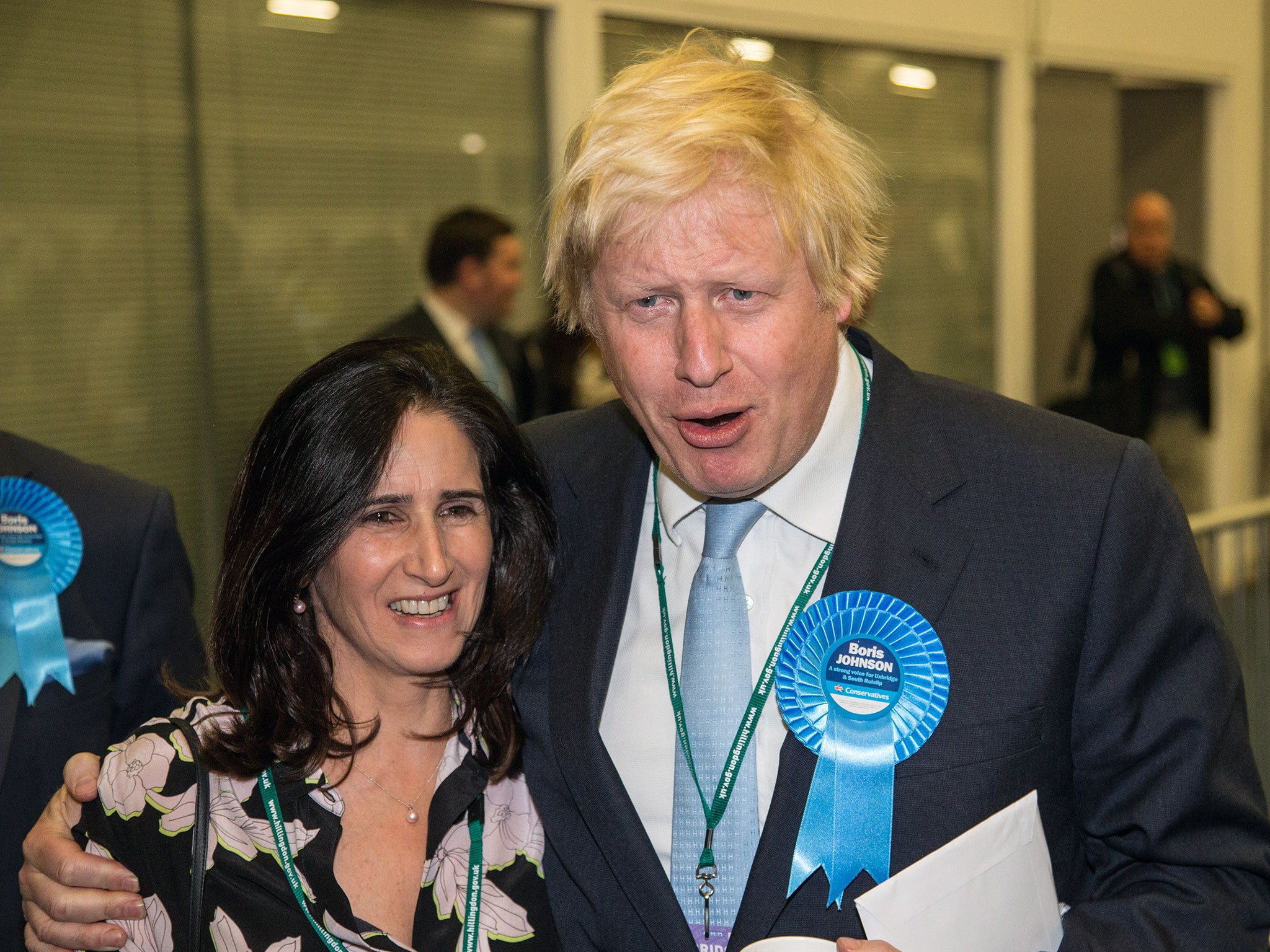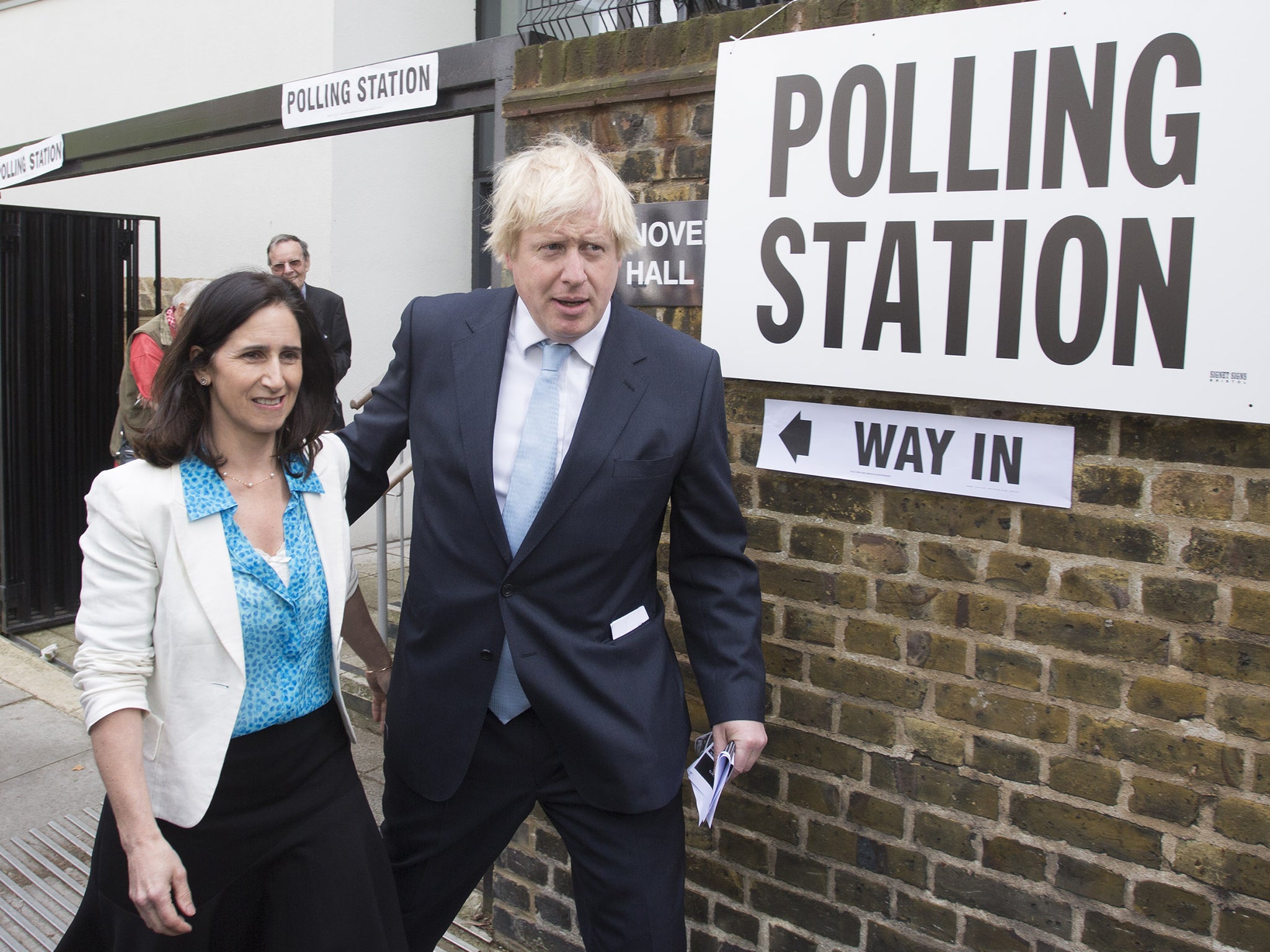Marina Wheeler, profile: The brains behind Boris Johnson
The Mayor’s wife couldn’t be more different from her husband – but are they on the same side of the EU debate?

Your support helps us to tell the story
From reproductive rights to climate change to Big Tech, The Independent is on the ground when the story is developing. Whether it's investigating the financials of Elon Musk's pro-Trump PAC or producing our latest documentary, 'The A Word', which shines a light on the American women fighting for reproductive rights, we know how important it is to parse out the facts from the messaging.
At such a critical moment in US history, we need reporters on the ground. Your donation allows us to keep sending journalists to speak to both sides of the story.
The Independent is trusted by Americans across the entire political spectrum. And unlike many other quality news outlets, we choose not to lock Americans out of our reporting and analysis with paywalls. We believe quality journalism should be available to everyone, paid for by those who can afford it.
Your support makes all the difference.The men in Marina Wheeler’s life are so famous that, outside her own professional circle, she is liable to be defined by them.
This week, The Spectator carried one of the more erudite contributions to the often stale arguments around the forthcoming EU referendum. The author argued cogently that, as David Cameron tours Europe’s capitals seeking a deal good enough for him to recommend to the British people, he is missing some of the issues that matter most.
Her particular concern was the EU’s Charter of Fundamental Rights, administered by the Court of Justice in Luxembourg – not to be confused with the European Convention on Human Rights, administered by the European Court of Human Rights, which is not an EU institution. When the charter was incorporated in the Lisbon Treaty in 2007, Tony Blair secured a UK opt out – or so he and other British politicians believed. But the court in Luxembourg appears to think that the charter has legal force in the UK, whether our government likes it or not. To a lawyer specialising in human rights, it matters a great deal who is right on this point.
This is a rare example of a serious issue being raised during the rather arid EU debate. But, inevitably, when it was reported, the focus of the reports was not the qualifications of the person doing the asking, but the fact that she is married to Cameron’s rival Boris Johnson. Pundits wondered if this implicit criticism of Cameron’s negotiating priorities was a sign that the Johnson household was on manoeuvres. Notably, there was no such reaction when the same author wrote a blog in June 2015 in defence of the Convention on Human Rights, though her views on that were further from mainstream Conservative thinking.
The Conservative election manifesto had promised to renounce the European Convention on Human Rights and replace it with a British bill of rights, to prevent the European Court in Strasbourg imposing decisions on the UK that offended the government. She argued that this would be a breach of various treaties and was the wrong approach. On the issues that had caused the most contention – prisoners’ voting rights, whole life sentences and armed conflict overseas – the European Court was backing down in the face of British objections. She dismissed as “Panglossian” an idea floated by the then justice secretary, Chris Grayling, that the court’s judgments could be “advisory” in the UK: “Let’s invite the Government to re-channel its efforts into strengthening these human rights mechanisms, shaped in our image, by our own hand – not sweep them away, in a destructive, un-conservative, even un-British, act of revolutionary fervour.”
These are words written by someone for whom human rights takes precedence over whatever loyalty she feels towards the Conservative Party. She is, after all, one of the UK’s foremost civil rights lawyers, with a law degree from Cambridge and a master’s in EU law. Most of her work in public law and human rights, according to the CV published on her chamber’s website, has focused on mental health, prisons, social care, armed conflict, education and privacy. She represented the Government in a high-profile case, involving a suspected Taliban commander who was held in detention by the British in Afghanistan for four months, and the Prison Service in a case involving a child who committed suicide in custody.
Through her professional life in the law, she has had decades of being close to men famous in other fields. Her father, Sir Charles Wheeler, was one of the leading television journalists of his generation. When he died in 2008, aged 85, his obituary in The Independent noted that “only a handful of correspondents have become household names. Charles Wheeler was incontestably one of them”. He was in Delhi as the BBC’s South-east Asia correspondent when he and Marina’s mother, Dip Singh, married in 1962.
In 1965, he was appointed Washington correspondent; and, in 1973, moved to Brussels as European correspondent. Nine-year-old Marina arrived in Brussels sporting an “Impeach Nixon” badge and was enrolled in a European school where she made friends with another youngster, to whom she explained the meaning of the word “impeach”. It was Boris Johnson, son of one of the first Britons to secure a senior job with the EU. Their paths diverged when she went to Bedales, a private boarding school in Hampshire, and then on to Cambridge, but converged when they met up again in London when they were both in their mid-twenties.
Some people find it extraordinary that a woman as capable as Ms Wheeler should tolerate a husband as unreliable as Boris Johnson, whose wandering eye and celebrity status meant that, sooner or later, a scandal was going to make national news. The lawyer Philippe Sands described to Boris’s biographer, Andrew Gimson, his reaction on seeing Marina arrive at his 30th birthday in October 1990, with Boris Johnson: “In comes our dearest, darlingest, teeniest Marina with a Tory – it was a ghastly moment … painful, hilarious and devastating.”

At some point, about seven more years into their marriage, she became aware that he was having an affair with the journalist Petronella Wyatt, daughter of Woodrow Wyatt, who was Margaret Thatcher’s favourite journalist. In November 2004, the tabloids got wind that Wyatt had had an abortion. Contacted by The Mail on Sunday, Boris declared: “I have not had an affair with Petronella. It is complete balderdash. It is an inverted pyramid of piffle.”
He was lying, of course, and his colourful language only added fuel to the story. After days of relentless publicity, including a piece in the News of the World stating as a fact that Patronella Wyatt had indeed been made pregnant by Marina’s husband, the Tory leader, Michael Howard, sacked Johnson from his post as shadow culture minister.
As if that were not enough, Marina had to endure another excruciating round of tabloid interest in April 2006, when the News of the World announced that her husband was having another affair, with a 29-year-old journalist named Anna Fazackerley. He was away in China when the story broke. She had a tribe of reporters on her doorstep, firing questions at her in front of her children.
She certainly entered the marriage with her eyes open. Even at the age of nine, Boris had impressed her as a wild character. Gimson learnt that, when the pair of them were dropped off to school, Boris would try to amuse her by rolling out of the car on to the ground.
When the Petronella Wyatt affair blew up, one of the many details hauled into the glare of publicity was that Marina had become pregnant at a time when Boris was still, formally, married to his old university flame, Allegra Mostyn-Owen. She was quoted by the Daily Mail saying: “I divorced him for adultery. It enabled him to marry Marina.” The divorce came through on 26 April 1993. They were married on 8 May. The first of their four children, Lara Lettice, was born on 12 June.
So Marina Wheeler knew that life with Johnson might not be uninterrupted domestic tranquillity, but she has stuck with him through turbulent times and not let it deflect her from her demanding career. Much as she may dislike seeing a horde of reporters outside her home, she must know that they will be back again one of these days – but hopefully they will be there to pursue a political story, not a sex scandal.
Marina Wheeler: A life in brief
Born: 1964.
Family: Elder daughter of journalist Charles Wheeler and Dip Singh. Married Boris Johnson in 1993. They have four children.
Education: European School of Brussels, Bedales and Cambridge University.
Career: Worked in Brussels before, in 1987, becoming a barrister specialising in human rights. A member of the Bar Disciplinary Tribunal. Appointed QC in 2016.
Join our commenting forum
Join thought-provoking conversations, follow other Independent readers and see their replies
Comments